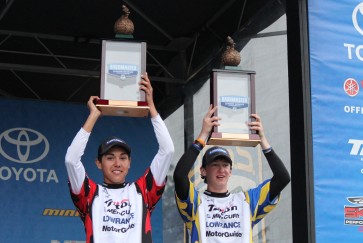Yates, Wood Claim Junior Nation titles
Category: Tournament
Oct 28th, 2013 by OutdoorsFIRST
Modified Oct 28th, 2013 at 12:00 AM
RUSSELLVILLE, Ark. – Going into the final hour of the Bassmaster Junior World Championship, Trevor Yates of Norman, Okla., had enough weight to win his age division. But he didn’t leave anything to chance.
Yates saved the best for last, catching 3-pound-plus largemouth in the final hour to seal the deal and win the 15-18 year-old age division. His five-fish limit weighed 12 pounds, 14 ounces, exactly 4 pounds better than runner-up finisher Henry Schomaker.
 |
|
|
Trevor Yates and Ryan Wood won the 2013 Bassmaster Junior World Championship on the Arkansas River.
|
“I was calm, but I still thought I needed a little more to seal the deal,” said the 17-year-old Yates, who started his quest for the Bassmaster Junior World Championship in the Stillwater (Okla.) Junior Bassmasters. “But once I caught the big one, I felt like I had it.”
St. Croix Pro Ryan Wood, 15, of Broomfield, Colo., caught a limit that weighed 8-14 to win the 11-14 year-old age division.
“It’s amazing, fantastic, unbelievable,” said Wood, who fishes at home with the Denver Junior Bassmasters. “It’s all that times a million.”
Yates and Wood each earned $5,000 college scholarships. A total of $21,000 in scholarship money was awarded to Junior World Championship contenders, who competed in a one-day event Saturday on Pool 9 of the Arkansas River.
Daryk Eckert from the Northern Division finished third (7-10) in the 15-18 group, followed by Brian Volkernick of the Eastern Division (7-4), Chase Heaton of the Western Division (2-6) and Ben Stone of the Southern Division (2-3)
In the 11-14 group, Noah Winslow of the Eastern Division finished second (6-11), Roman Chapman of the Northern Division was third (4-8), Remington Wagner of the Central Division was fourth (3-13), Clayton Childs of the Southern Division was fifth (1-7), and Ryan Appleby of the Mid-Atlantic Division was sixth (0-0).
The Junior World Championship was held on the Arkansas River immediately downstream from the dam that creates Lake Dardanelle, where the B.A.S.S. Nation National Championship was taking place this week. Unlike Dardanelle, Pool 9 fishes much more like a river than a lake, especially when the dam’s hydroelectric power plant is releasing water to produce electricity.
Rock structures were critical areas for both Yates and Wood. Both anglers caught the majority of their fish around the jetties, dikes and revetments that direct river flows as part of the McClellan-Kerr Arkansas River Navigation System.
Yates caught an early limit that weighed an estimated 9 pounds before noon, alternating between the main river, where current came into play, and a couple of small backwater areas. Most of his fish came on a black buzzbait and a Livingston Lures square-billed crankbait in chartreuse with a blue back.
The crankbait produced the kicker fish on a stretch of bank within sight of the boat ramp, just a few hundred yards below the dam at the top end of the pool.
“I prefished here two weeks ago, and the fish seemed to be focused on wood pilings on the jetties and wood in other backwater areas,” Yates said. “But there weren’t any fish there on Friday. So we fished the outside of the creeks and backwaters and focused on rock instead.”
After an absence of current in the first hour Saturday, hydroelectric generation began and a noticeable current washed downstream. Wood took advantage of it by fishing jetty tips, a popular technique on the Arkansas River. His primary location was a straight, half-mile stretch of river with a series of jetties protruding toward the main channel.
“We caught a few fish doing that in practice,” Wood said. “This morning, we went to one and came around it into the current and we caught a double. So we just started doing that to all the jetties in the area.”
Wood caught his fish on Strike King 1.5 square-billed crankbait and a Strike King Series 3. He modified the lures by painting them with black spray paint.
“When I did my research, I heard black crankbaits were good here,” he said. “So I just painted them black the easiest way I could.”
Much like the B.A.S.S. Nation contenders, the Junior World Championship anglers qualified through a series of local, state and divisional tournaments. Local B.A.S.S. Nation members served as the anglers’ boat drivers during practice and competition, but drivers weren’t allowed to share any information with the competitors.
The anglers were paired based on their B.A.S.S. Nation division, with the 11-14 contender and the 15-18 contender from the same divisions fishing from the same boats. Their weights were kept separately, and anglers competed against one another based on age division.